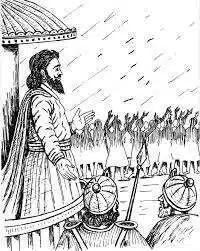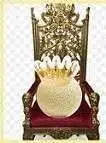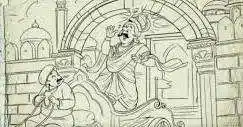
Our advice on how to ace the test is written by experts who have been there and done that. Study The Tale of Melon City Extra Questions with this advice and add the missing piece to your exams.
Extra Questions, Notes, Assignment and study material for Class 11th as Per CBSE Syllabus
Chapter- 8 English Language and Literature
The Tale of Melon City Extra Questions
By- Vikram Seth
Introduction of the lesson- The Tale of Melon City
Introduction

The Tale of Melon City is a story in verse. The tale is humorous even though it is unrealistic and unbelievable. It ridicules the king, his ministers, the wise men and the common people. All of them behave foolishly. Not one of them applies his brain. The tone of the poem is satirical. The just and placid king behaved rashly like a fool. He got an arch gate constructed above the highway for the enlightenment of the onlookers. He hit his crown against the arch. He ordered hanging for the guilty. But he changed his orders quite soon until he ordered his own execution.
The new ruler was chosen foolishly by an idiot. He was asked to name the new king. He loved melons. So he pronounced melon at once—and the melon was crowned king. The people had no interest in who ruled over them provided they were not harassed.
Important Word-Meanings of difficult words from the lesson- The Tale of Melon City
Word-Meanings And Reference
Page 71
just- justice-loving, fair and impartial,न्याप्रिय placid-calm, gentle, शांतिप्रिय proclaimed-made a public announcement, उदघोषड़ा करवा दी arch-curved gateway, मेहराबदार दरबाजा triumphantly-successfully, victoriously, सफल ढंग से span-cover, stretch from one side to another, सड़क के ऊपर दोनों और उठा thoroughfare-public road, meant for common use, राजमार्ग edify-improve morally , नैतिक रूप से उत्थान करना spectators-viewers, onlookers, दर्शक
Pages 72-73
he-the King, राजा frown-displeasure,त्योरि चढ़ गयी disgrace-insult, dishonour, अपमान gallows-structure or platform on which the criminal was hanged, फाशी का तख्ता या टिक्ति fault-error, mistake, दोष गलती called a halt-stopped, रोक दिया proceedings-work, legal or royal action, क़ानूनी कार्यवाही summon-sent for, call, बुलाओ masons-those who build with bricks or stone, राजगीर quivering-trembling with fear, भए से कांपते हुए architect-one who makes the plan of the building, बस्तुकार ordain-order, आदेश देना amendments-changes, improvements, शंशोधन lost his head- was confused, चकरा गया tricky-Intricate, जटिल पेचीदा counsel-advice, consultation, सलाह मसवरा nay-no, नहीं
Page 74
quavering-trembling, काँपती हुई culprit-wrongdoer, गलती करने बाला banged-hit, struck, टक्कर मारी scaffold-platform for execution, फाशी का तख्ता mused-thought, विचार किया from uttering-mumbling, फुशफुश कर रहा था perceived-noticed, भांप लिया trembled-shook with fear, काँप गया consideration-discussion on, विचार विमर्श guilt-fault, दोष immediately-without delay, तुरंत noose-sliding knot tied for hanging someone, फंदा decree-order.
Page 75
unruly-restless, agitated, उद्दण्ड pondered-considered, विचार किया dilemma-a difficult situation, दुबिधा herald-announcer, उदघोषक proclaim-announce, लोगो को बताये enforced-carried out, acted upon, पालन किया जायेगा due ceremony-proper grand way, with rituals, शोभा के साथ idiot-brainless, मुर्ख melon-a fruit, तरबूज reverently-respectfully. सादर
Page 76
customary-usual, according to custom, रीती के अनुसार rejoice-feel happy. खुश होना OK-all right, ठीक है Laissez-faire-policy of giving freely without government control.
Short and Simple Summary of the lesson in English– (The Tale of Melon City)/ Summary in simple Words/ Critical appreciation of the lesson – (The Tale of Melon City)
Complete Summary
Once there was a justice-loving and cool-headed king. He decided to get an arch built over the main highway. His motive was to benefit and improve the onlookers, both mentally and morally.
The workers built the gate. They dared not disobey the king. The king rode down the highway to show himself to the people. It so happened that his crown hit against the low-built arch, and was lost. The king was very angry. He took it as an insult. He decided to hang the chief of builders. All arrangements were made for the execution. The chief of builders was taken past the king. He told the king that he was innocent. He put the blame on the workmen.
The king put off the hanging for a while. Being just and serious, he forgave the builder and ordered the hanging of all the workmen. The workers passed on the blame to the brickmakers who had made the bricks of the wrong size. The king then sent for the masons who stood to tremble with fear. They blamed the architect for the low arch. And now it was the turn of the architect to suffer hanging. The architect too had a point in his defence. He reminded the king of the change he himself had made to the plans. The king heard this and turned pale. He was in a dilemma. So, he declared that the case was complicated and he needed some consultations. He sent for the wisest man in the country. A very old and experienced man was presented before the king. He suggested that the king should punish the culprit and, in this case, the arch itself was that guilty thing. The arch was taken towards the gallows. But suddenly, a courtier or minister spoke in favour of the march saying that they could not hang the arch because it had touched the sacred head of the king.

The king agreed with his minister. But by now, the crowd was in a rebellious mood. They wanted some action, a hanging. So, to please the public, the king said that somebody should be hanged whether he was guilty or not. So, a noose was set up. But it was somewhat high. Many people were measured but only the king was found tall enough to fit the noose. And he was, therefore, hanged.
Summary in Hindi/ The Tale of Melon City
Complete Summary
एक समय एक न्याप्रिय तथा ठंडे दिमाक बाला राजा राज्य कर रहा था उसने प्रमुख राजमार्ग के ऊपर एक टोररड दयारा बनबाने का निष्चय किया उसका उद्देस्य था की दर्शको का मानशिक तथा नैतिक उठान हो जाए
मजदूरों ने दोयार बनबा दिया उनका साहस न था कि राजा की अवहेलना करे राजा सोयम राजमार्ग पर लोगो को अपना दर्शन देने के लिए निकल पढ़ा हुआ ये कि दयार कि उचाई कम होने से राजा का मुकुट टकराकर गिर गया राजा आग- बबूला हो गया उसने इसे अपमान समझा उसने आदेश दिया कि इस दोयार को बनाने बाले को फाशी दे दी जाए इस मृत्यु दंड के तैयारी कर ली गयी बिल्डरों का प्रमुख जब राजा के सामने से गुजरा तो उसने कहा मई तो निर्दोष हूँ सारा दोष मजदूरों का था
राजा ने मृत्यु दंड को कुछ समय के लिए टाल दिया न्याप्रिय और गभींर सोभाव होने के कारण उसने निर्माता को माफ़ कर दिया तथा सभी मजदूरों को फाशी देने का आदेश दे दिया मजदूरों ने सारा दोष ईट

बनाने बाले के सिर पर मढ़ दिया जिन्होने गलत आकर की ईट बनाई थी राजा ने फिर राजगीरों को बुला भेजा; बे भय से काँपते सामने खड़े थे उन्होने बाश्तुकार को इतना नीचा दोयार बनाने के लिए दोषी बताया अब बास्तुकार की बारी आ गयी कि उसे फाशी दी जाए बास्तुकार के पास भी अपने बचाव के लिए एक बहाना था उसने राजा को याद दिलाया कि दोयार के नक्शे में फेरबदल तो सोयम राजा ने ही की थी राजा ये सुनकर पीला पढ़ गया इसलिए उसने कहा कि मामला जटिल है और उसे सलाह लेनी पड़ेगी उसने देश के शर्बाधिक बुद्धिमान व्यक्ति को पेश किये जाने का आदेश दिया एक अति बृद्ध पर अनुभवी व्यक्ति को राजा के सामने उपश्तिथ किया गया उसने सुझाव दिया कि राजा का काम है अपराधी को दंड देना तथा इस मामले में अपराधी तो दोयार था इसलिए इस मेहराबदार दोयार को फाशी की टिकटी की ओर ले जाया गया पर अचानक एक मंत्री दोयार के बचाव में बोल पढ़ा की दोयार को फाशी नहीं दी जा सकती क्योकि उसने तो राजा का मस्तक ही सादर छुआ था
राजा बात मान गया पर अब जनता विदद्रोहों करने लगी बे तो किसी को दण्डित किये जाने की मांग कर रहे थे इसलिए राजा ने किसी को लटकाने के लिए एक फंदा बनबाया पर बह भी उचाई पर था अनेक लोगो की लम्बाई का माप लिया गया पर केवल राजा ही उस फंदे पर लटकने के लिए उपयुक्त पाया गया और उसे फाशी दे दी गयी
मंत्री गढ़ों को बहुत राहत मिल गयी लोग अब शांत हो चुके थे अगला काम था दूसरे शाशक की खोज करना घोसड़ा राज्य की रीती के अनुशार की गयी एक मुर्ख नगर दोयार से गुजरा रच्छको ने उसे रोक लिया तथा कहा कि नए राजा का चयन करो मुर्ख को तरबूज ही पसंद थे इसलिए बह सभी प्रश्नो का एक ही उत्तर देता रहा -तरबूज या खरबूजा
मंत्रियो ने उस मुर्ख को ही न्य साशक चुन लिया उन्होंने सिंघाशन पर एक तरबूज की इस्थापना कर दी
ये घटना बहुत पुराने समय की है पर यदि आज भी आप लोगो से पूछे कि आपका शाशक तरबूज जैसा क्यों दिखता है तो बे कहते है कि इसका कारण तो देश में राजा के चयन की प्रिक्रिया की रीती है उनकी अपनी राय का कोई महत्य नहीं है और उन्हें इसी रीती से तब तक कोई शिकायत भी नहीं है जब तक उन्हें शांति और आज़ादी से रहने दिया जाता है
Following is the complete question bank for The Tale of Melon City
The Tale of Melon City Extra Questions and Answers
Short Answer Type Questions
1. Why does the king order an arch to be constructed over the public road?
Ans. The cool-headed king got an arch gate constructed over the public road. He hoped to enlighten and uplift the onlookers morally.
2. What annoyed the king as he rode down that thoroughfare?
Ans. As he rode down the road, his crown struck against the low-built arch. It was thrown off and lost. This enraged the king.
3. ‘This is a disgrace’, said the king. How did he react?
Ans. The low-built arch hit against the king’s crown which fell to the ground and was lost. The king took it as an insult. He ordered the chief of builders to be hanged.
4. The king, in this poem, is just and placid. Why does he then lose his temper? Does he carry his notion of justice too far?
Ans. The king was known to be calm and cool-headed. But that was a blatant lie. He lost his temper soon. Being just, he ordered the guilty person or thing to be hanged. But he was an utter fool. He carried his notion of justice too far. In doing so he had invited his own hanging.
5. How did the chief of builders, the workmen and the masons save their lives?
Ans. The chief of builders passed on the blame to the workmen. The workers in order to save their lives blamed the brick makers and the masons. The masons put the blame on the architect for the low arch.
6. How did the architect turn the tables on the king himself?
Ans. The architect was presented before the king to face conviction. But he reminded the king of the changes made by the king himself in the building plan. The king became nervous. He said he would consult the wisest man in the state on the issue.
7. Who on the old wise man’s advice was led to the gallows? Why had the proceeding to be halted?
Ans. The old man was considered wise on the basis of his age. He advised the king to hang the arch itself which had thrown the crown off the king’s head.
8. How did the king save his own skin when the architect turned the accusing finger at him?
Ans. The architect blamed the king himself for making faulty changes in the original building plan. The king found himself cornered. So he declared that he would seek the advice of the wisest man in the state on that tricky issue.
9. How did circumstances lead to the execution of the king himself?
Ans. On the wise man’s advice, the king ordered the arch to be executed. But a councillor defended the arch. The people, however, were restless. They demanded action and hanging. So a noose was set up to hang somebody. The king alone was tall enough to fit the noose. Hence, the king himself had to be hanged.
10. What opinion do you form about the king from the story?
Ans. This story highlights the foolishness of a so-called calm and just ruler. The king carried his notion of justice too far. He not only lost his own life but also gave the chance to another fool, a melon, to occupy the throne.
11. What custom was enforced to get a new ruler?
Ans. The state custom to find a new ruler was very funny. The first person to pass the city gates was to choose the ruler of the state. The idiot who passed by liked melons. Soon his suggestion, a melon was put on the throne.
12. Comment on the calibre of the king, his ministers, the people and the customs of the state.
Ans. All the characters in the story are block-headed. The king was crazy and brainless. The ministers followed the old custom blindly and set a melon on the throne. The custom to choose the ruler was just silly. The people, at large, were no good. They demanded a hanging even if it was their own king. They did not mind who the king was, as long as they could live peacefully.
13. Why have the king’s ministers been described as practical-minded men? What is ironical about the description?
Ans. The ministers were in a hurry to find a new ruler. They lacked practical wisdom when they followed the old custom. They detained a fool and asked him to name the new ruler. What an irony!
14. How was the new king of the state finally selected and crowned?
Ans. The old custom was followed while selecting a new ruler. The first person to pass by the city gate was asked to name the king. That idiot, being fond of melons, named melon for the royal seat. And a Melon was crowned and set up on the throne.
15. Why do the common people accept the melon-king without any protest?
Ans. The common people valued their peaceful living and freedom more than the quality of the king. It mattered little for them whether the king was wise or foolish, so long as he did not harass the people.
Important Long/ Detailed Answer Type Questions- to be answered in about 100 -150 words each Value based questions-
Long Answer Questions
1. Narrate ‘The Tale of Melon City’ in about 100 words. What message does it convey?
Ans. The king of that nameless state was known to be just and cool-headed. But truly speaking, he was foolish, crazy and brainless. Once he got constructed an arch above the public road for the mental and moral improvement of the onlookers. One day as he rode down that highway, the low-built arch hit the king’s crown. The angry king decided to hang the culprit. He summoned the builders, the workers, the masons, the architect to undergo punishment. They all passed on the blame to each other. On the old wise man’s advice, the arch itself was to be hanged. But a councillor saved it. But somebody had to be hanged. The king alone was tall enough to fit the noose which was set very high. He was hanged. As per the custom, whosoever passed the city gates first, had the honour of naming the next king. That day a fool was the first person to pass by the gates and he was asked to choose the king. He spoke only one-word “Melon” to all the questions and the Melon was crowned. The common people had no say in the selection. They only wanted to live in peace and liberty.
2. The king was just and placid. How did he carry his notion of justice a bit too far?
Ans. The king was known to be cool-headed, fair and just. But he was, in fact, a fool with a wavering mind. He foolishly thought that the victory gate would improve the people morally and mentally. He lost his temper when his crown fell off his head under the arch of low height. He at once ordered hanging for the builder, the workers, the masons and the architect. He carried his sense of justice a little too far. He agreed to hang the arch itself. He finally ordered his own hanging. The story is humorous and ironical.
3. How does a melon become the ruler of the state? Why are the people happy with him?
Ans. The king who never applied his own brain went by what others said. When the people demanded somebody to be hanged, the king had to pay a heavy price for his foolishness. He himself was taken to the gallows. According to the state custom, the new ruler was to be chosen by the first person who passed by the city gates. That day an idiot happened to pass by the gates who said “Melon” to any question which people asked him. And the ministers followed the custom mindlessly. They brought a melon and crowned it as their new ruler. The people raised no objection. They only wanted to live in peace and liberty. They accepted the melon king who followed the policy of non-interference in whatever the people did.